| 2023/2024 | Small TLEF | Gabriella Wong & Asal Taheri | Pharmaceutical Sciences | Remediation Program for Students Experiencing Academic Challenges during Practicum in the Entry-to-Practice PharmD Program | Year 1 | 26798 | Active | | | 2024/2025 | Small TLEF | Gabriella Wong & Asal Taheri | Year 2 | 13306 | | | | | | | |
| 2023/2024 | Small TLEF | Jose Rodriguez Nunez | Science | Chemistry and Societal Impacts: Re-imagining the First-Year Experience in the Lecture and Lab with CHEM 141 | Year 1 | 24819 | Active | | | 2024/2025 | Small TLEF | Jose Rodriguez Nunez | Year 2 | 24654 | | | | | | | |
| 2023/2024 | Small TLEF | Jackie Chambers & Bridgette Clarkston | Science | MAKING CONNECTIONS: Students, faculty, staff, and community partners as co-creators of a biodiversity science course for undergraduates | Year 1 | 24318 | Completed | 2024-TLEF-SP-Final-Report-Chambers-WEB.pdf |  | 2024/2025 | Small TLEF | Jackie Chambers & Bridgette Clarkston | Year 2 | 24318 |  | | | | | | |
| 2023/2024 | Small TLEF | Sven Bachmann | Science | Math and EOAS Collaborate to Improve Climate Education at UBC | Year 1 | 27893 | Completed | 2024-TLEF-SP-Final-Report-Bachmann-WEB.pdf | | 2024/2025 | Small TLEF | Sven Bachmann | Year 2 | 18699 | | | | | | | |
| 2023/2024 | Small TLEF | Rana Tarzemany | Dentistry | Development of Novel Surgical Simulation Technology to Enhance Education of Dental Students and Surgical Residents at the UBC Faculty of Dentistry | Year 1 | 28175 | Active | |  | | | | | | | | | | | | |
| 2023/2024 | Small TLEF | Ronaldo Cerri | Land & Food Systems | Creating a hybrid, interactive and enhanced learning experience for students in animal health and physiology courses | Year 1 | 40000 | Active | | | 2024/2025 | Small TLEF | Ronaldo Cerri | Year 2 | 10000 | | | | | | | |
| 2024/2025 | Large TLEF | Laurie McNeill & Andrew Owen | Arts | We’re only Human? Educative Frameworks for Artificial Intelligence, Academic Integrity, and Writing in the Faculty of Arts | Year 1 | 69861 | Active | |  | 2025/2026 | Large TLEF | Laurie McNeill & Andrew Owen | Year 2 | 70947 | | | | | | | |
| 2024/2025 | Large TLEF | Justin Bull | Sauder School of Business | Integrating SDG-Related Content into Business Curriculum to Develop Future Responsible Leaders | Year 1 | 42689 | Active | | | 2025/2026 | Large TLEF | Justin Bull | Year 2 | 37901 | | | | | | | |
| 2024/2025 | Large TLEF | Tara Ivanochko | Science | Implementing an Environmental Science (ENSC) Curriculum Renewal | Year 1 | 74048 | Active | |  | 2025/2026 | Large TLEF | Tara Ivanochko | Year 2 | 76893 | | | | | | | |
| 2024/2025 | Large TLEF | Dongwook Yoon | Science | Preparing for an Automated Future: Building Automation Resilience in Computer and Data Science Education | Year 1 | 63250 | Active | |  | 2025/2026 | Large TLEF | Dongwook Yoon | Year 2 | 66544 | | | | | | | |
| 2024/2025 | Small TLEF | Sathish Gopalakrishnan | Applied Science | CPSLab: Design and Analysis of Cyber-Physical Systems using a Safety-First Approach | Year 1 | 46628 | Active | |  | | | | | | | | | | | | |
| 2024/2025 | Small TLEF | Andrew Binet | Applied Science | Developing a Community-Engaged Capstone Onboarding Model for Urban Studies | Year 1 | 16978 | Active | | | 2025/2026 | Small TLEF | Andrew Binet | Year 2 | 21114 | | | | | | | |
| 2024/2025 | Small TLEF | Jonathan Nakane | Applied Science | Development of a new case study incorporating themes of Indigenous engagement and consultation in a core first year engineering course | Year 1 | 29999 | Active | |  | | | | | | | | | | | | |
| 2024/2025 | Small TLEF | Sergey Kravchenko | Applied Science | Integration of Simulation Software Teaching Modules into Materials and Manufacturing Engineering Curricula to Enhance Practical Learning | Year 1 | 50000 | Completed | 2024-TLEF-SP-Final-Report-Kravchenko-WEB.pdf | | | | | | | | | | | | | |
| 2024/2025 | Small TLEF | Siobhán Wittig McPhee | Arts | Building and assessing the use of audio artifacts in blended geography courses | Year 1 | 5000 | Active | | | 2025/2026 | Small TLEF | Nina Hewitt | Year 2 | 2000 | | | | | | | |
| 2024/2025 | Small TLEF | David Gaertner | Arts | City Poems: Transformative Learning through Locative Poetry | Year 1 | 49254 | Active | | | | | | | | | | | | | | |
| 2024/2025 | Small TLEF | Szu Shen | Arts | Community as Pedagogy: Building Sustainability for Community Engaged Research | Year 1 | 25000 | Active | | | 2025/2026 | Small TLEF | Szu Shen | Year 2 | 25000 | | | | | | | |
| 2024/2025 | Small TLEF | Lillian May | Arts | Creation of a Canvas Module: “What Science Can Tell You About How To Be Successful in University” | Year 1 | 12165 | Active | | | 2025/2026 | Small TLEF | Lillian May | Year 1 | 13538 | | | | | | | |
| 2024/2025 | Small TLEF | Laila Ferreira | Arts | Cultivating Inclusive Writing Instruction: Planting Seeds Across the Curriculum | Year 1 | 21309 | Active | | | 2025/2026 | Small TLEF | Laila Ferreira | Year 2 | 26772 | | | | | | | |
| 2024/2025 | Small TLEF | Evan Mauro & Kirby Manià | Arts | Learning Research, Learning Reciprocity: Student Community Engagement with the Making Research Accessible Initiative | Year 1 | 25000 | Active | |  | 2025/2026 | Small TLEF | Evan Mauro & Kirby Manià | Year 2 | 25000 | | | | | | | |
| 2024/2025 | Small TLEF | Isabelle Delage-Béland | Arts | Modernizing traditional French grammar courses: Towards an active, descriptive, and inclusive approach for advanced students | Year 1 | 16250 | Active | |  | 2025/2026 | Small TLEF | Isabelle Delage-Béland | Year 2 | 6142 | | | | | | | |
| 2024/2025 | Small TLEF | Nick Hall | Arts | Transforming Language Learning: Inclusive Interactive Web-Based Course Materials for Studying Elementary Japanese | Year 1 | 33943 | Active | | | 2025/2026 | Small TLEF | Nick Hall | Year 2 | 15432 | | | | | | | |
| 2024/2025 | Small TLEF | Jolanta Aleksejuniene | Dentistry | Enhanced Teaching and Learning of Critical Thinking in the Undergraduate Dental Curricula | Year 1 | 40761 | Active | | | 2025/2026 | Small TLEF | Jolanta Aleksejuniene | Year 2 | 9239 | | | | | | | |
| 2024/2025 | Small TLEF | Teresa Dobson | Education | Ethical and Professional Use of Generative AI in Teaching and Learning | Year 1 | 26591 | Active | | | | | | | | | | | | | | |
| 2024/2025 | Small TLEF | Carolyn McEwen | Education | Improving student learning and experience through curriculum mapping | Year 1 | 32840 | Active | |  | | | | | | | | | | | | |
| 2024/2025 | Small TLEF | Kari Grain | Education | Reimagining Experiential Education: Pedagogies and Field Experiences | Year 1 | 25000 | Active | | | | | | | | | | | | | | |
| 2024/2025 | Small TLEF | Jasmin Ma | Education | UBC School of Kinesiology: Implementation of a Clinical Exercise Physiologist Pathway | Year 1 | 24895 | Active | |  | 2025/2026 | Small TLEF | Jasmin Ma | Year 2 | 24974 | | | | | | | |
| 2024/2025 | Small TLEF | Andrew Almas | Forestry | Creating an Urban Forest Demonstration at the Malcolm Knapp Research Forest Arboretum | Year 1 | 47791 | Active | | | | | | | | | | | | | | |
| 2024/2025 | Small TLEF | Bianca Eskelson | Forestry | FVS-BC Exercises for Forest Resources Management and Conservation | Year 1 | 26692 | Active | | | | | | | | | | | | | | |
| 2024/2025 | Small TLEF | Nicholas Coops | Forestry | Geospatial Solutions for the Climate Emergency: Advancing Earth Observation, Geographic Information Systems and Remote Sensing Education | Year 1 | 48720 | Active | | | | | | | | | | | | | | |
| 2024/2025 | Small TLEF | Michelle Zeng | Forestry | Innovating Forestry Education: Advancing Accessibility, Equity, Diversity, and Inclusion | Year 1 | 37135 | Active | | | 2025/2026 | Small TLEF | Michelle Zeng | Year 2 | 12829 | | | | | | | |
| 2024/2025 | Small TLEF | Michael Johnson | Land & Food Systems | LFS 252 Hybrid Delivery Project | Year 1 | 23660 | Active | | | | | | | | | | | | | | |
| 2024/2025 | Small TLEF | Philip D. Crowell | Medicine | Dental Ethics and DEI: Toward a Strategic Plan to Align Clinical Ethics with the Competencies of DEI | Year 1 | 27521 | Active | |  | | | | | | | | | | | | |
| 2024/2025 | Small TLEF | Sarah Purcell | Medicine | Development, refinement, and evaluation of educational modules for identifying and managing eating disorders among students enrolled in healthcare-related programs | Year 1 | 29327 | Active | | | 2025/2026 | Small TLEF | Sarah Purcell | Year 2 | 17838 | | | | | | | |
| 2024/2025 | Small TLEF | Ben Mortenson | Medicine | Implementing Climate and Sustainability Education in Occupational Therapy Programs | Year 1 | 25000 | Active | |  | 2025/2026 | Small TLEF | Ben Mortenson | Year 2 | 25000 | | | | | | | |
| 2024/2025 | Small TLEF | Heather Buckley | Medicine | Layered Learning: Building critical community capacity for teaching medical students | Year 1 | 49934 | Completed | 2024-TLEF-SP-Final-Report-Buckley-WEB.pdf |  | | | | | | | | | | | | |
| 2024/2025 | Small TLEF | Hannah Wittman | Science | Ethical Engagement for Climate and Environmental Justice | Year 1 | 24530 | Active | |  | 2025/2026 | Small TLEF | Hannah Wittman | Year 2 | 24530 | | | | | | | |
| 2024/2025 | Small TLEF | Steven Wolfman | Science | Redesigning computer-based labs to be more engaging by identifying and implementing use cases relevant to students | Year 1 | 7048 | Active | | | | | | | | | | | | | | |
| 2024/2025 | Small TLEF | Firas Moosvi | Science | Sustainable migration to digital assessments at scale | Year 1 | 30000 | Active | | | 2025/2026 | Small TLEF | Firas Moosvi | Year 2 | 20000 | | | | | | | |
| 2024/2025 | Small TLEF | Jacquelyn Cragg | Pharmaceutical Sciences | Statistics Bakers: a Recipe Box for Biostatistics and Critical Appraisal Courses at The University of British Columbia | Year 1 | 38716 | Active | | | | | | | | | | | | | | |
| 2024/2025 | Small TLEF | Larry Leung | Pharmaceutical Sciences | The BRAIN Project - Building Resources and Accessibility in Neurology for Practical Learning | Year 1 | 30000 | Active | |  | 2025/2026 | Small TLEF | Larry Leung | Year 2 | 20000 | | | | | | | |
| 1997/1998 | Small TLEF | J. P. Kimmins | Forestry | Forestry 202 - Forest Ecology Learning Enhancement Tool | Year 1 | | Completed | | | 2000/2001 | Small TLEF | J. P. Kimmins | Year 2 | 11125 | | | | | | | |
| 1997/1998 | Small TLEF | Ed Auld | Arts | A Hot-linked CD-ROM Version of the British Open University’s Self Study Package “The Flexible Learning Approach to Physics (FLAP)” | Year 1 | | Completed | | | 1999/2000 | Small TLEF | Ed Auld | Year 2 | 10000 | | | | | | | |
| 1998/1999 | Small TLEF | Jülyet Benbasat | Science | Design and Implementation of Integrated Science Core Courses | Year 1 | 30935 | Completed | | | 1999/2000 | Small TLEF | John Gosline | Year 2 | 49750 | | | | | | | |
| 2025/2026 | Large TLEF | Christoph Sielmann & Paul Lusina | Applied Science | ChatUBC: Conversational AI for Personalized and Targeted Learning | Year 1 | 74030 | Active | | | | | | | | | | | | | | |
| 2025/2026 | Large TLEF | Alireza Bagherzadeh | Applied Science | EngE-AI: A GenAI-augmented Tool to Enhance Engineering Education in Cultivating Critical Thinking | Year 1 | 87198 | Active | | | | | | | | | | | | | | |
| 2025/2026 | Large TLEF | Siobhán Wittig McPhee | Arts | Online Course Enhanced Learning Intelligent Assistant (OCELIA) - scaffolding academic reading and course material | Year 1 | 117282 | Active | | | | | | | | | | | | | | |
| 2025/2026 | Large TLEF | Laura Nelson | Arts | Unpacking the Black Box: Critical AI Literacies for Arts Education | Year 1 | 85087 | Active | | | | | | | | | | | | | | |
| 2025/2026 | Large TLEF | Fong Chan & Jamie Yuen | Pharmaceutical Sciences | GENRx: Generative AI-Enhanced Role-Playing for Pharmacy Education and Physical Examination | Year 1 | 99967 | Active | | | | | | | | | | | | | | |
| 2025/2026 | Large TLEF | Kayli Johnson | Science | GRASP: Using Generative AI to Efficiently Provide Spaced, Elaborative, Interleaving Formative Assessments | Year 1 | 116883 | Active | | | | | | | | | | | | | | |
| 2025/2026 | Large TLEF | Sarah Gergel | Forestry | AI-Powered Course Assistant for Forestry: Enhancing Engagement and Interactive Learning | Year 1 | 84603 | Active | | | | | | | | | | | | | | |
| 2025/2026 | Large TLEF | Annabel Lyon | Arts | Procedural Poetry Funhouse | Year 1 | 99997 | Active | | | | | | | | | | | | | | |
| 2025/2026 | Large TLEF | Colleen Inglis | Pharmaceutical Sciences | EMPATH-AI: Generative AI for Enhancing Empathy and Communication Skills in Pharmacy Education | Year 1 | 91215 | Active | | | | | | | | | | | | | | |
| 2025/2026 | Small TLEF | Tonia Welch | Applied Science | Course Development for the Indigenous STEM Bridging Program | Year 1 | 44257 | Active | | | | | | | | | | | | | | |
| 2025/2026 | Small TLEF | Ashley Scott | Applied Science | Developing an Artificial Intelligence-driven Virtual Reality simulation to enhance clinical education for nurse practitioner students | Year 1 | 49102 | Active | | | | | | | | | | | | | | |
| 2025/2026 | Small TLEF | Pranav Chintalapati | Applied Science | Enhancing Socio-Technical Skills in Engineering Education through Cross-Cultural Experiential Learning | Year 1 | 18276 | Active | | | | | | | | | | | | | | |
| 2025/2026 | Small TLEF | Nassim Adhami | Applied Science | Inclusive Excellence: Bringing Universal Design for Learning into Undergraduate Nursing Education | Year 1 | 46424 | Active | | | | | | | | | | | | | | |
| 2025/2026 | Small TLEF | Frances Chen | Arts | Facilitating Student Success in the Psychology Major: Focus on the PSYC 217-218 Transition | Year 1 | 19506 | Active | | | | | | | | | | | | | | |
| 2025/2026 | Small TLEF | Caroline Lebrec | Arts | Building Self-Paced Modules for the French Placement Test | Year 1 | 13500 | Active | | | | | | | | | | | | | | |
| 2025/2026 | Small TLEF | Mallory Tater | Arts | Curriculum Renewal for CRWR 200: Introduction to Creative Writing | Year 1 | 20133 | Active | | | | | | | | | | | | | | |
| 2025/2026 | Small TLEF | Elizabeth Shaffer | Arts | Innovating the iSchool Classroom: Piloting a hybrid model for Indigenizng graduate pedagogy | Year 1 | 40000 | Active | | | | | | | | | | | | | | |
| 2025/2026 | Small TLEF | Chelsea Freeborn | Arts | Interdisciplinary Modular Simulation-Based Learning for Family Studies, Psychology, and Sociology | Year 1 | 20924 | Active | | | | | | | | | | | | | | |
| 2025/2026 | Small TLEF | Jorn Dettmer | Forestry | Augmented Reality Assisted Equipment Safety and Setup Learning Tool | Year 1 | 21664 | Active | | | | | | | | | | | | | | |
| 2025/2026 | Small TLEF | Andrés Varhola | Forestry | Bridging Learning Outcomes and Competencies for Student Success: Enhancements to a Curriculum Mapping Tool | Year 1 | 35892 | Active | | | | | | | | | | | | | | |
| 2025/2026 | Small TLEF | Kelly Allison | UBC Health | Equity in Action: Renewing the Integrated Curriculum for Accessible, Inclusive Health Education | Year 1 | 32540 | Active | | | | | | | | | | | | | | |
| 2025/2026 | Small TLEF | Carrie Anne Vanderhoop | Forestry | HGI Development of a foundational Indigenous focused course that would be open to all and serve as a pre-requisite for HGSE 371 Re-Storying History: Indigenous Perspectives | Year 1 | 49659 | Active | | | | | | | | | | | | | | |
| 2025/2026 | Small TLEF | Elisabeth Bailey | Applied Science | Self & Collective Care for Nursing Students: Development of a Train-the-Trainer Initiative | Year 1 | 38452 | Active | | | | | | | | | | | | | | |
| 2025/2026 | Small TLEF | Sandra Brown | Land & Food Systems | Agriculture in a Changing World: Students tackling food security, biodiversity and climate change through a first-year course | Year 1 | 13562 | Active | | | | | | | | | | | | | | |
| 2025/2026 | Small TLEF | Maja Krzic | Land & Food Systems | Soil science educational resources - virtual reality of soil in the landscape | Year 1 | 45162 | Active | | | | | | | | | | | | | | |
| 2025/2026 | Small TLEF | Justin Student | Medicine | Conversational AI for Clinical Confidence: Supporting the Transition to Real-World Patient Care in Medical Education | Year 1 | 35718 | Active | | | | | | | | | | | | | | |
| 2025/2026 | Small TLEF | Kendall Ho | Medicine | Harmonizing interdisciplinary virtual teams (HIVE): Development and implementation of a spiral educational intervention content in UBC Health Integrated Curriculum | Year 1 | 24983 | Active | | | | | | | | | | | | | | |
| 2025/2026 | Small TLEF | Eden Fussner-Dupas | Medicine | Meet BIOCBOT, A GenAI Biochemistry Study Buddy tool designed to help you learn-by-teaching | Year 1 | 40657 | Active | | | | | | | | | | | | | | |
| 2025/2026 | Small TLEF | Kayla Fang & Gilly Lau | Pharmaceutical Sciences | AI AM READY: Readying Pharmacy Students for Practice in a World with GenAI | Year 1 | 31872 | Active | | | | | | | | | | | | | | |
| 2025/2026 | Small TLEF | Jason Min | Pharmaceutical Sciences | Building deep AI-integrated pedagogy using the aEHR | Year 1 | 27500 | Active | | | | | | | | | | | | | | |
| 2025/2026 | Small TLEF | Nahid Walji | Science | AI and the Assessment of Mathematical Thinking: How to guard against “cognitive offloading” and enable students’ critical thinking through and with AI | Year 1 | 20000 | Active | | | | | | | | | | | | | | |
| 2025/2026 | Small TLEF | Mehrdad Oveisi | Science | AIQuest: Enhancing Assessment Creation and Review through an AI-Powered Question Bank Management System | Year 1 | 49841 | Active | | | | | | | | | | | | | | |
| 2025/2026 | Small TLEF | Robin Stoodley | Science | Alchemy lab manual for student-customized learning in chemistry labs | Year 1 | 13910 | Active | | | | | | | | | | | | | | |
| 2025/2026 | Small TLEF | Sara Cannon | Science | Anti-Colonial Fisheries Science: Developing a course on Community-Driven Science in the Institute for Oceans and Fisheries, With a Focus on Indigenous Partnerships | Year 1 | 22991 | Active | | | | | | | | | | | | | | |
| 2025/2026 | Small TLEF | Denise Gabriel | Science | Expanding Access to Field-Based Learning through Immersive Virtual Tours: A Universal Design for Learning Approach to Inclusive, Experiential Education in Field Courses | Year 1 | 29673 | Active | | | | | | | | | | | | | | |
| 2025/2026 | Small TLEF | James Charbonneau | Science | Experiencing Diversion: Engagement and Development following the Introduction of the Diversionary Process | Year 1 | 10127 | Active | | | | | | | | | | | | | | |
| 2025/2026 | Small TLEF | Roger Beckie | Science | Generating Interactive Learning | Year 1 | 38552 | Active | | | | | | | | | | | | | | |
| 2025/2026 | Small TLEF | Kshamta Hunter | VP Academic | Centering and Advancing Indigenous Climate Justice in Climate Education | Year 1 | 25000 | Active | | | | | | | | | | | | | | |
| 2025/2026 | Small TLEF | Sara Kozicky | VP Students | Wellbeing and Climate Change Intersect in the Classroom - Developing a Resource Toolkit and an Instructor Network to Support Student Learning | Year 1 | 32792 | Active | | | | | | | | | | | | | | |
| 2025/2026 | Small TLEF | Patricia A. Shaw | Arts | Development Project for Online Multi-modal FNEL Learning Resources: Musqueam Language Program (FNEL) & Arts ISIT (Arts Digital Collections) | Year 1 | 30605 | Active | | | | | | | | | | | | | | |
| 2025/2026 | Small TLEF | Petra Mikulan | Education | Embedding Climate Trauma-Informed Pedagogy in Teacher Education Courses through a Novel Approach of Drag-Pedagogy | Year 1 | 20967 | Active | | | | | | | | | | | | | | |
| 2017/2018 | Large TLEF | Blair Satterfield | Applied Science | Integrated Design Learning through Making & Building @ SALA: Bringing design-making and building infrastructure (tools and expertise) directly to students in the classroom, studio, and in the field | Year 1 | 46150 | Completed | 2019-TLEF-Final-Report-Satterfield-WEB.pdf | 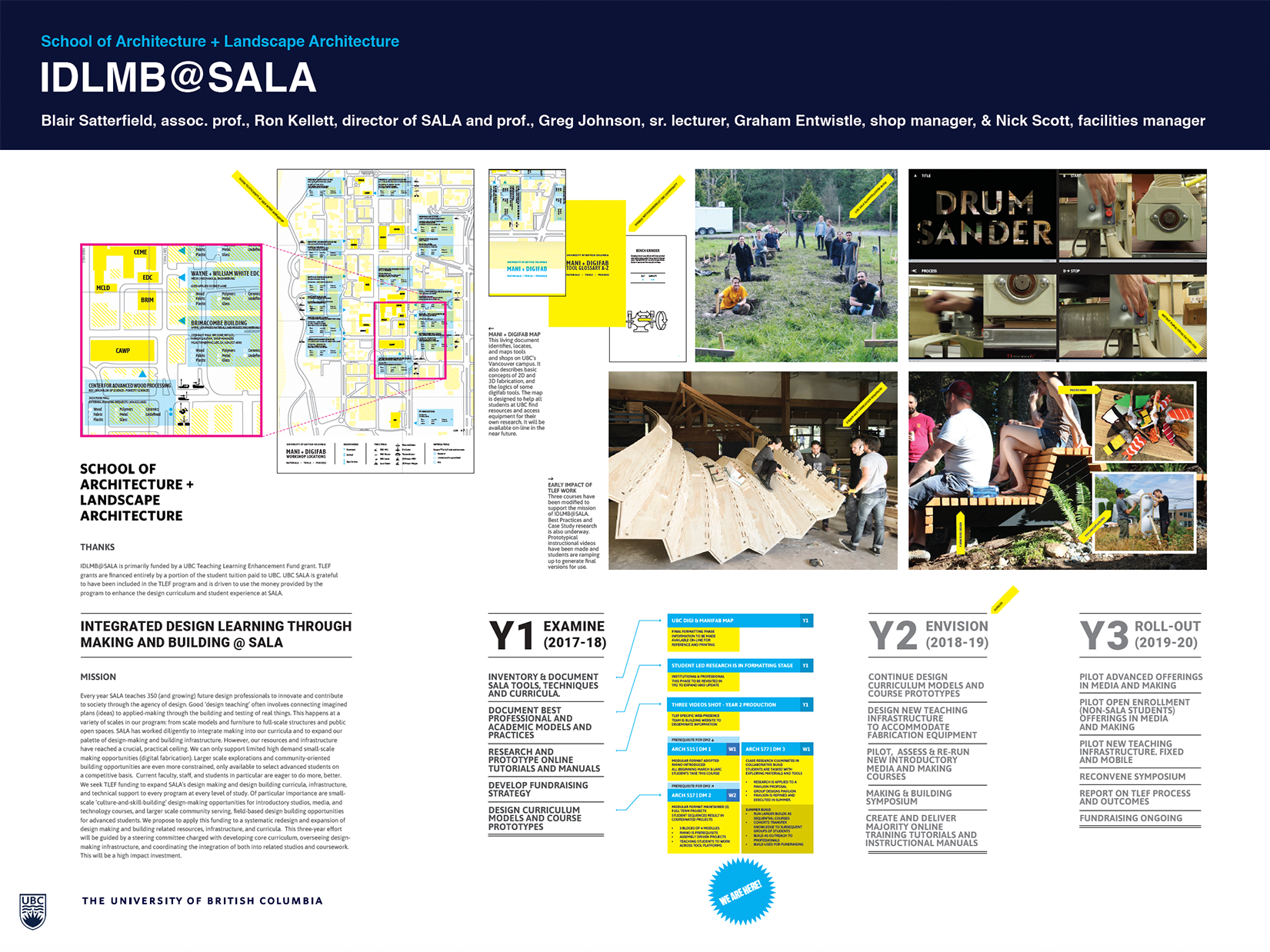 | 2018/2019 | Large TLEF | Blair Satterfield | Year 2 | 104125 |  | 2019/2020 | Large TLEF | Blair Satterfield | Year 3 | 31328 | |
| 2015/2016 | Large TLEF | Janet Giltrow | Arts | Educational and Career Outcomes for UBC Arts Students: Towards a New Paradigm | Year 1 | 60611 | Completed | 2017-TLEF-Final-Assanand-WEB.pdf | 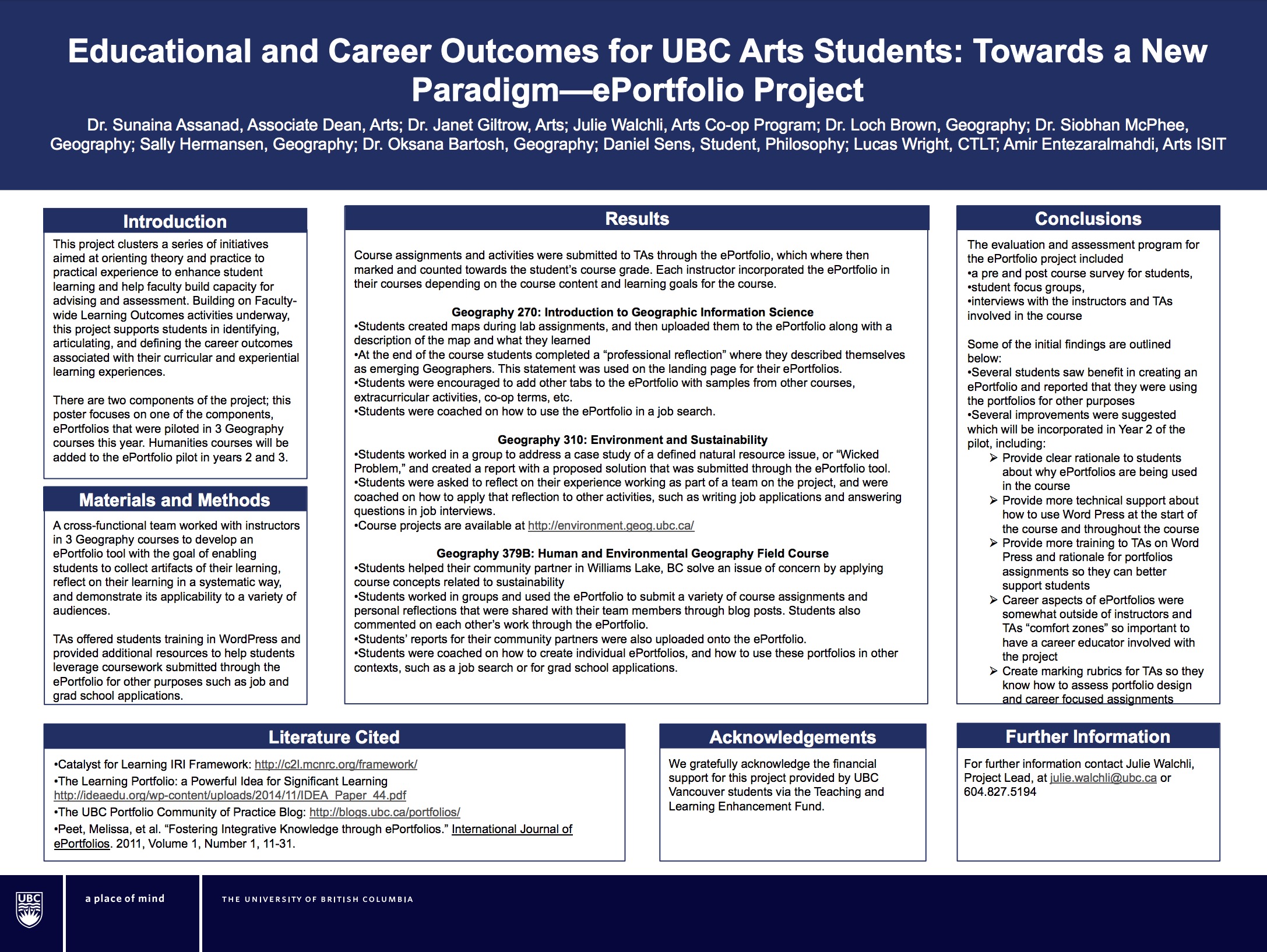 | 2016/2017 | Large TLEF | Sunaina Assanand | Year 2 | 61518 | 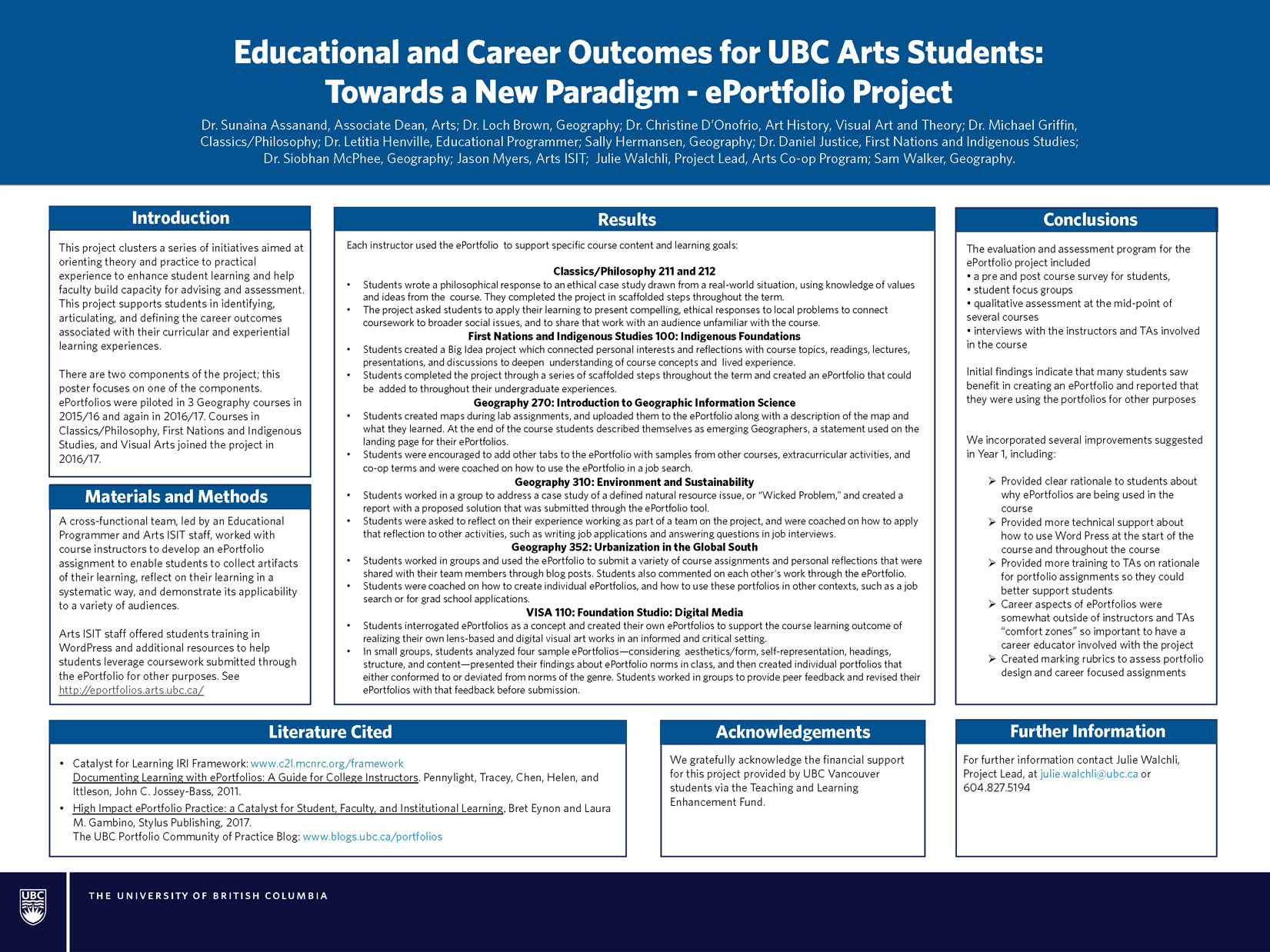 | 2017/2018 | Large TLEF | Sunaina Assanand | Year 3 | 80000 | 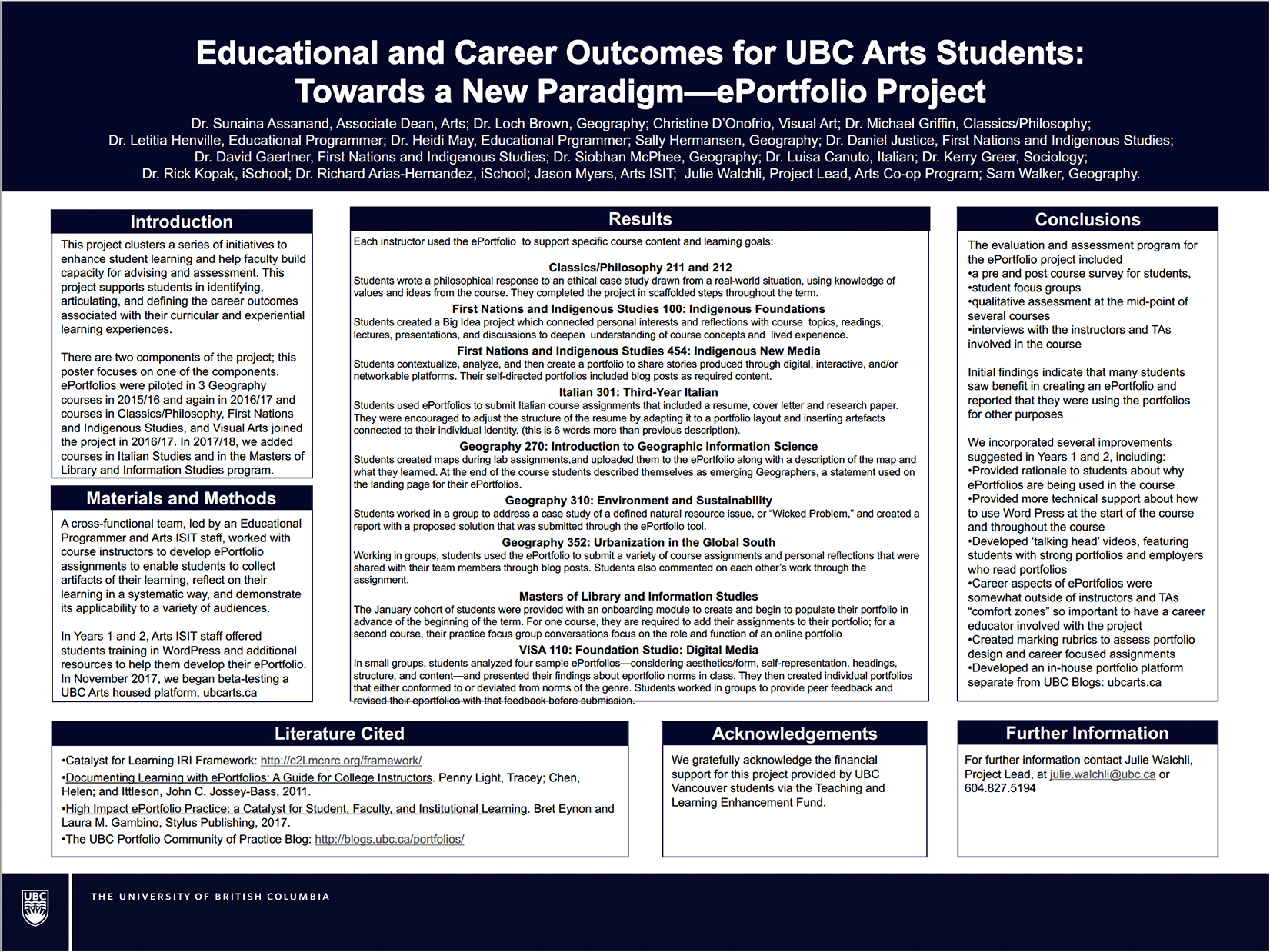 |
| 2017/2018 | Large TLEF | Laurie McNeill | Arts | Our Cheating Hearts: Academic Integrity Curriculum Design in First-Year Arts Programs | Year 1 | 63002 | Completed | 2019-TLEF-Final-Report-McNeill-WEB.pdf |  | 2018/2019 | Large TLEF | Laurie McNeill | Year 2 | 44079 |  | 2019/2020 | Large TLEF | Laurie McNeill | Year 3 | 15626 | |
| 2017/2018 | Large TLEF | Darren Warburton | Education | Indigenous Studies in Kinesiology | Year 1 | 100200 | Completed | | 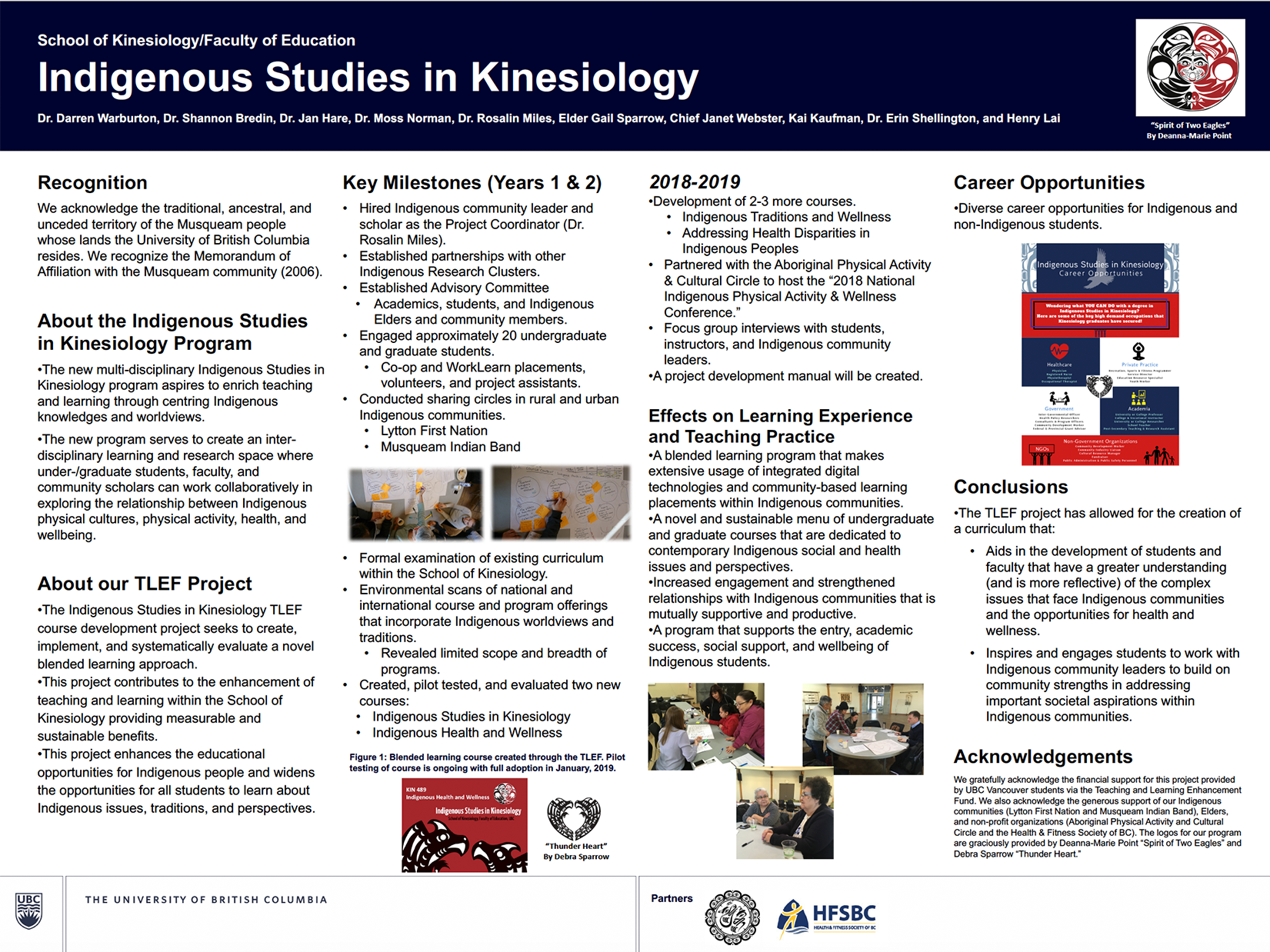 | 2018/2019 | Large TLEF | Darren Warburton | Year 2 | 103500 |  | 2019/2020 | Large TLEF | Darren Warburton | Year 3 | 45300 |  |
| 2015/2016 | Large TLEF | Saraswathi Vedam | Medicine | Birth Place Toolkit for the Health Professions: Dialogue and Shared Decisions | Year 1 | 74284 | Completed | 2017-TLEF-Final-Report-Vedam-WEB.pdf | | 2016/2017 | Large TLEF | Saraswathi Vedam | Year 2 | 69280 |  | 2017/2018 | Large TLEF | Saraswathi Vedam | Year 3 | 70252 |  |
| 2017/2018 | Large TLEF | Walter Algar | Science | Data-Enabled Pedagogies and Technology for Teaching and Learning Critical-Thinking and Decision Making Skills | Year 1 | 104032 | Completed | |  | 2018/2019 | Large TLEF | Walter Algar | Year 2 | 122354 |  | 2019/2020 | Large TLEF | Walter Algar | Year 3 | 27048 | |
| 2016/2017 | Large TLEF | Sara Harris | Science | Development of cost effective strategies for teaching, learning and assessing scientific reasoning abilities in large face-to-face and distance education general science courses | Year 1 | 111786 | Completed | 2018-TLEF-Final-Harris-WEB.pdf | 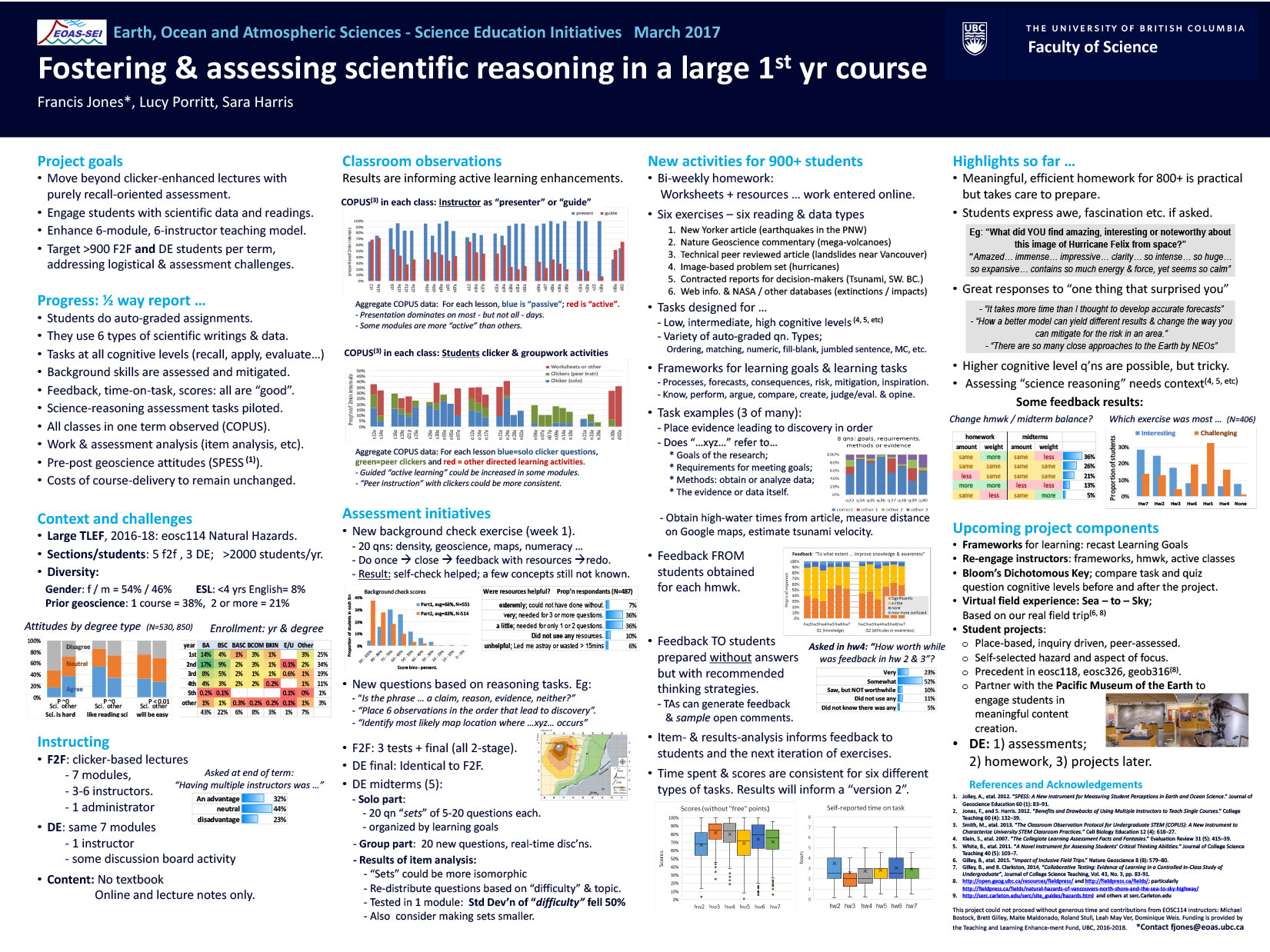 | 2017/2018 | Large TLEF | Sara Harris | Year 2 | 65202 | 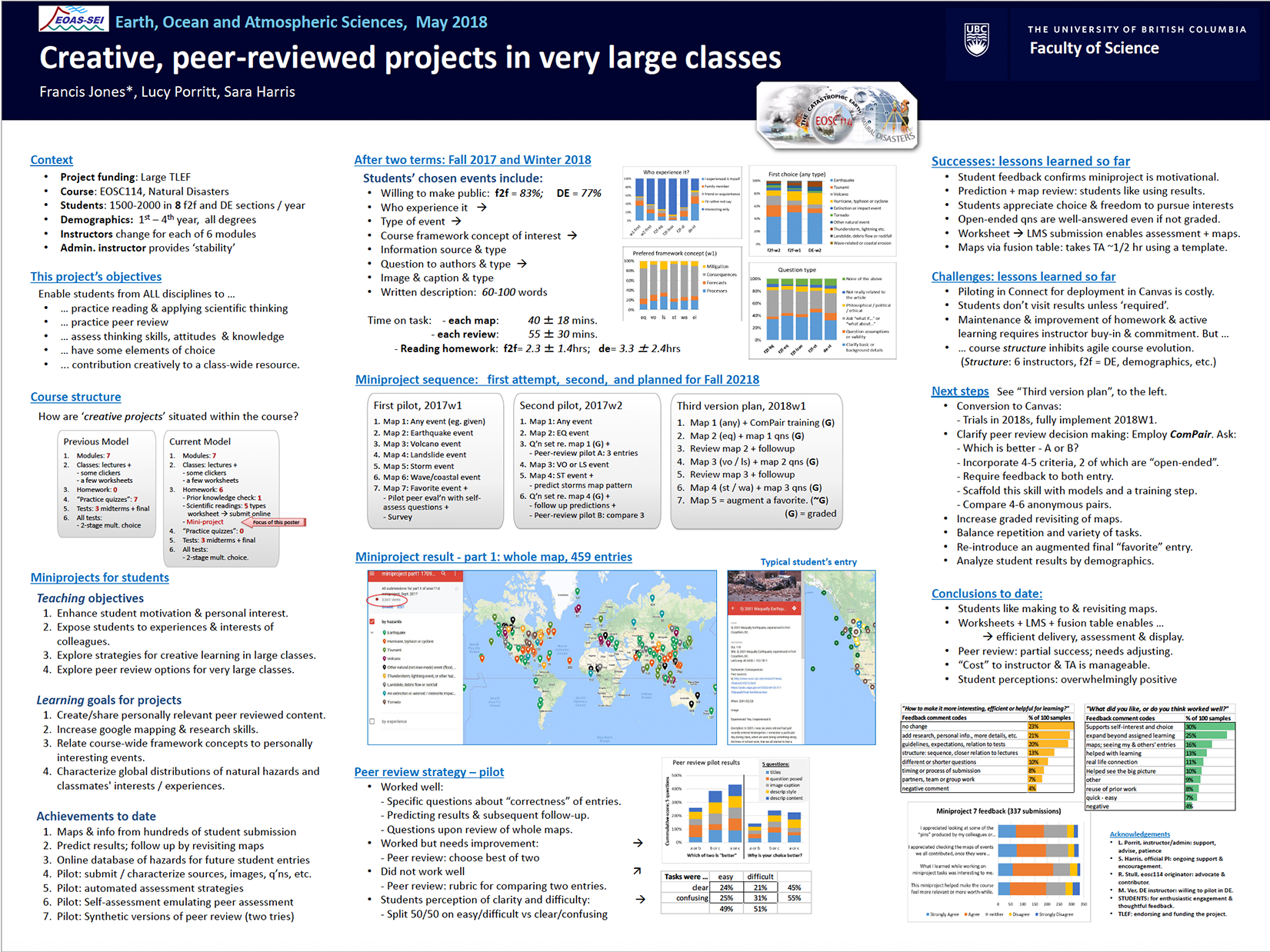 | 2018/2019 | Large TLEF | Sara Harris | Year 3 | 29594 |  |
| 2017/2018 | Large TLEF | Steven Hallam | Science | Experiential Data science for Undergraduate Cross-Disciplinary Education (EDUCE) | Year 1 | 81833 | Completed | 2020‑TLEF‑Final-Report‑Hallam-WEB.pdf |  | 2019/2020 | Large TLEF | Steven Hallam | Year 2 | 85698 | | 2020/2021 | Large TLEF | Steven Hallam | Year 3 | 81833 | |
| 2017/2018 | Large TLEF | Patty Hambler | VP Students | Increasing student capacity for academic success, deeper learning, and wellbeing | Year 1 | 79964 | Completed | 2019-TLEF-Final-Report-Jung-WEB.pdf | 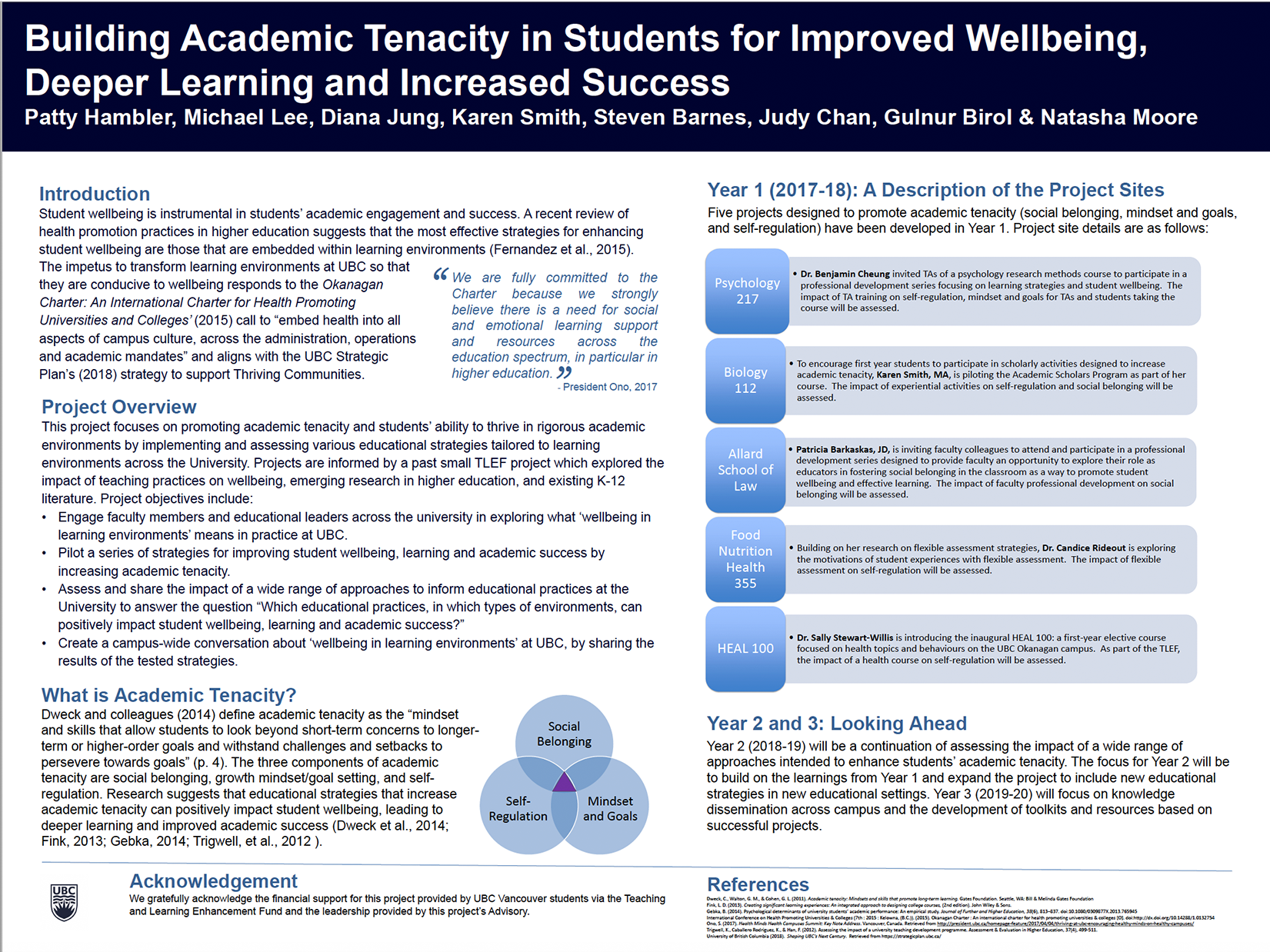 | 2018/2019 | Large TLEF | Patty Hambler | Year 2 | 79284 |  | 2019/2020 | Large TLEF | Diana Jung | Year 3 | 84737 | 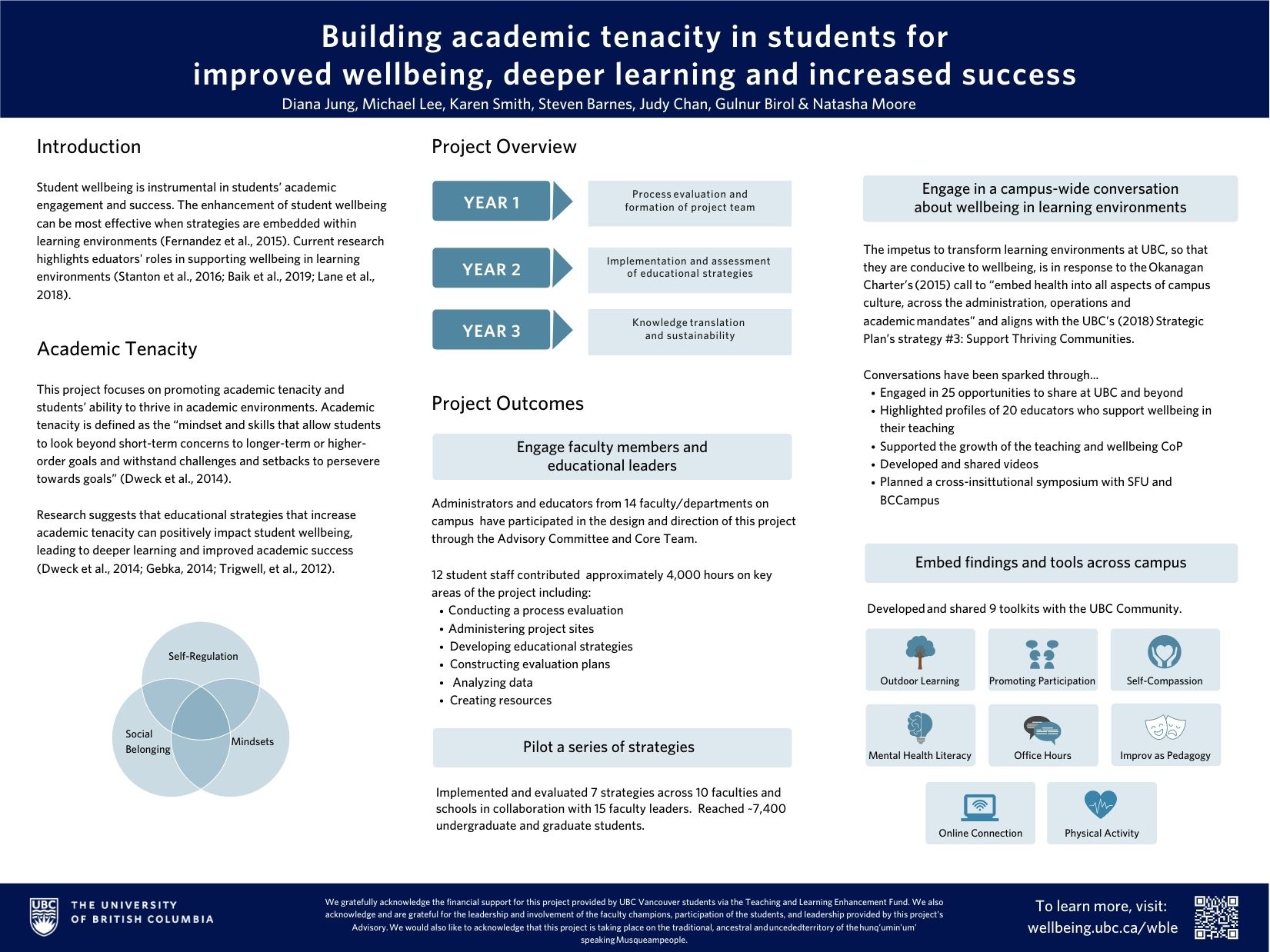 |
| 2017/2018 | Small TLEF | Tara Mayer | Arts | Curating Curiosities: Object-Based Learning in Museum and Classroom Settings | Year 1 | 4584 | Completed | | | 2018/2019 | Small TLEF | Tara Mayer | Year 2 | 3987 | | 2019/2020 | Small TLEF | Tara Mayer | Year 3 | 7828 | |
| 2017/2018 | Small TLEF | Sara Shneiderman | Arts | Himalayan Languages, Cultures, and Communities: integrating language learning, community engagement, and Area Studies knowledge | Year 1 | 17703 | Completed | 2019-TLEF-Final-Report-Shneiderman-WEB.pdf |  | 2018/2019 | Small TLEF | Sara Shneiderman | Year 2 | 27123 |  | 2019/2020 | Small TLEF | Sara Shneiderman | Year 3 | 5174 | |
| 2016/2017 | Small TLEF | Georg Rieger | Science | Animated worked examples to support self-directed learning in Physics 100 | Year 1 | 14232 | Completed | 2018-TLEF-Final-Rieger-WEB.pdf | 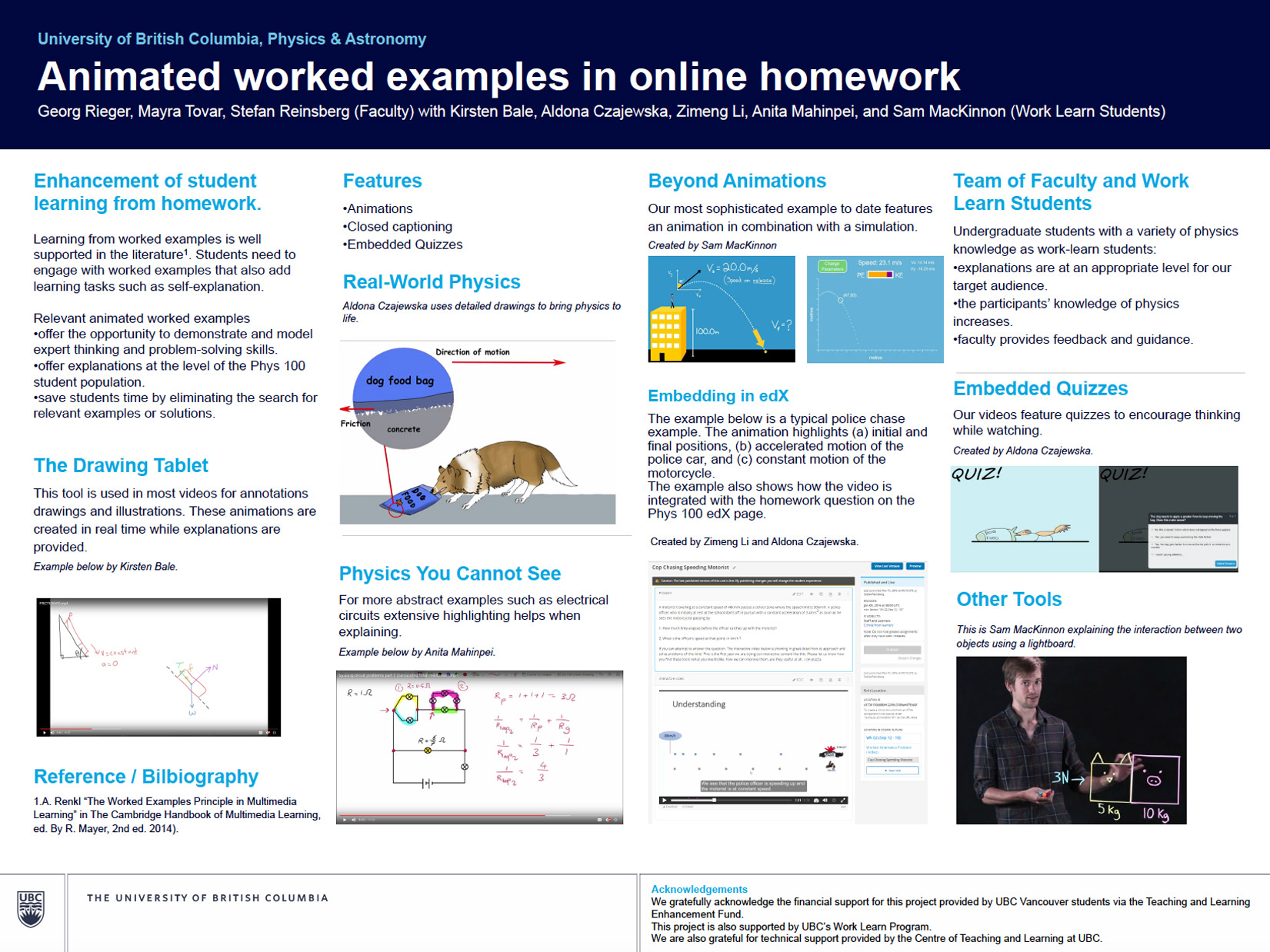 | 2017/2018 | Small TLEF | Georg Rieger | Year 2 | 14184 | | 2018/2019 | Small TLEF | Georg Rieger | Year 3 | 12000 | 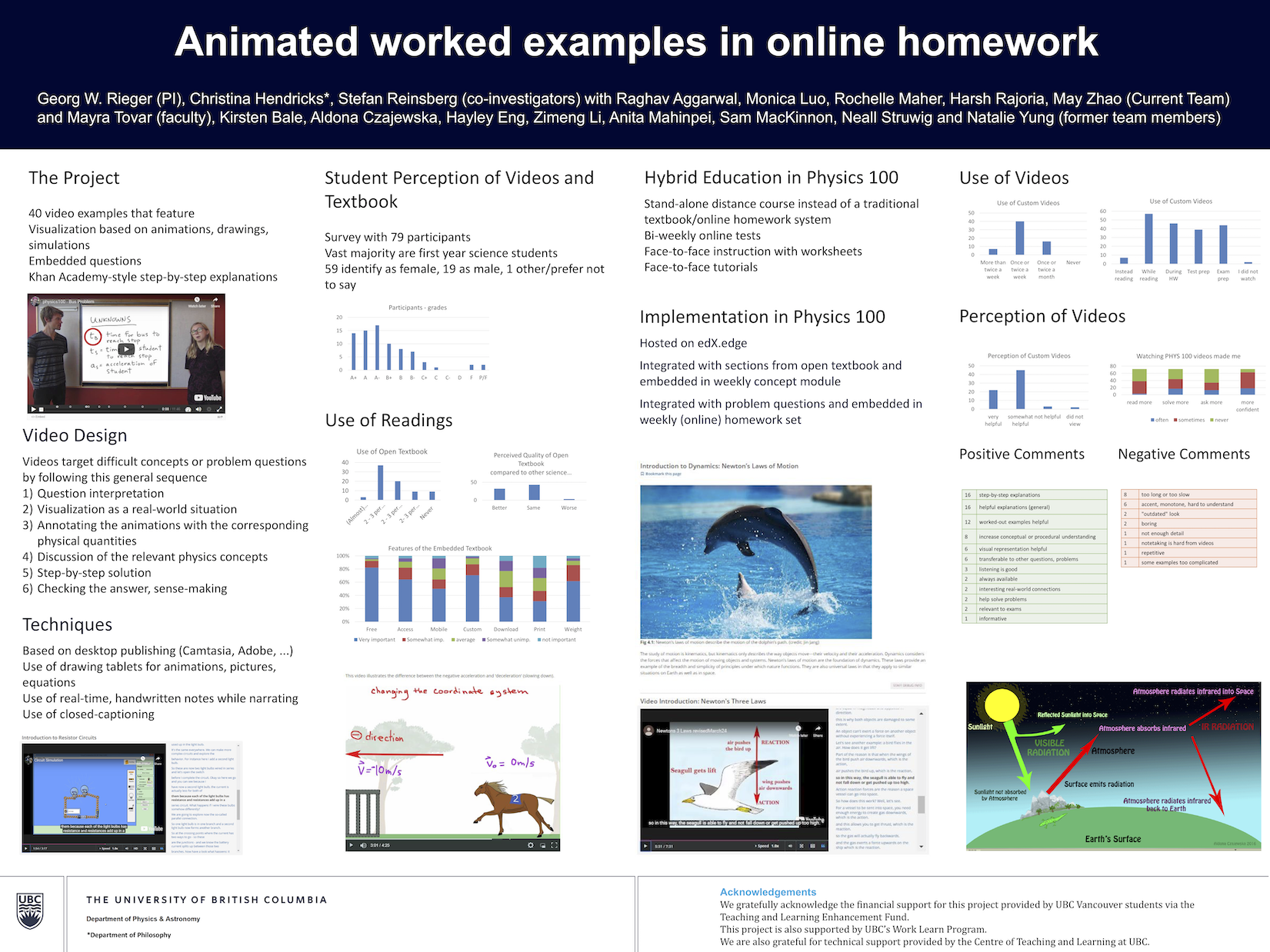 |
| 2015/2016 | Small TLEF | Doug Bonn | Science | Structured Quantitative Inquiry Labs: Developing Critical Thinking in First Year Physics Labs | Year 1 | 25700 | Completed | 2017-TLEF-SP-Final-Bonn-WEB.pdf | 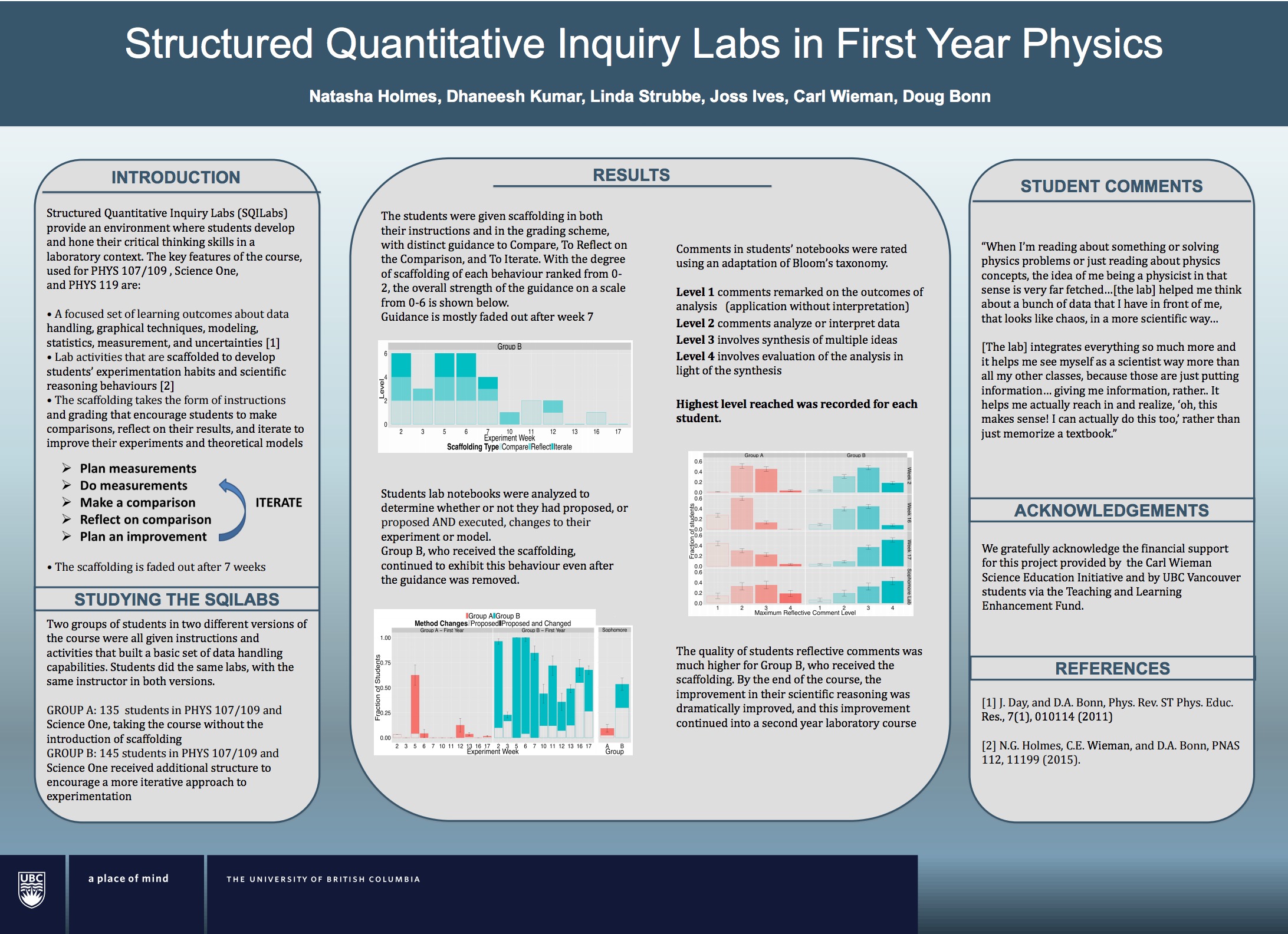 | 2016/2017 | Small TLEF | Doug Bonn | Year 2 | 16500 | | 2017/2018 | Small TLEF | Doug Bonn | Year 3 | 7750 | |
| 2014/2015 | Small TLEF | Siobhán Wittig McPhee | Arts | Human and Environmental Geography Experiential Learning Initiative | Year 1 | 29200 | Completed | 2016-TLEF-SP-Final-Report-McPhee-WEB.pdf | | 2015/2016 | Small TLEF | Siobhán Wittig McPhee | Year 2 | 16200 | 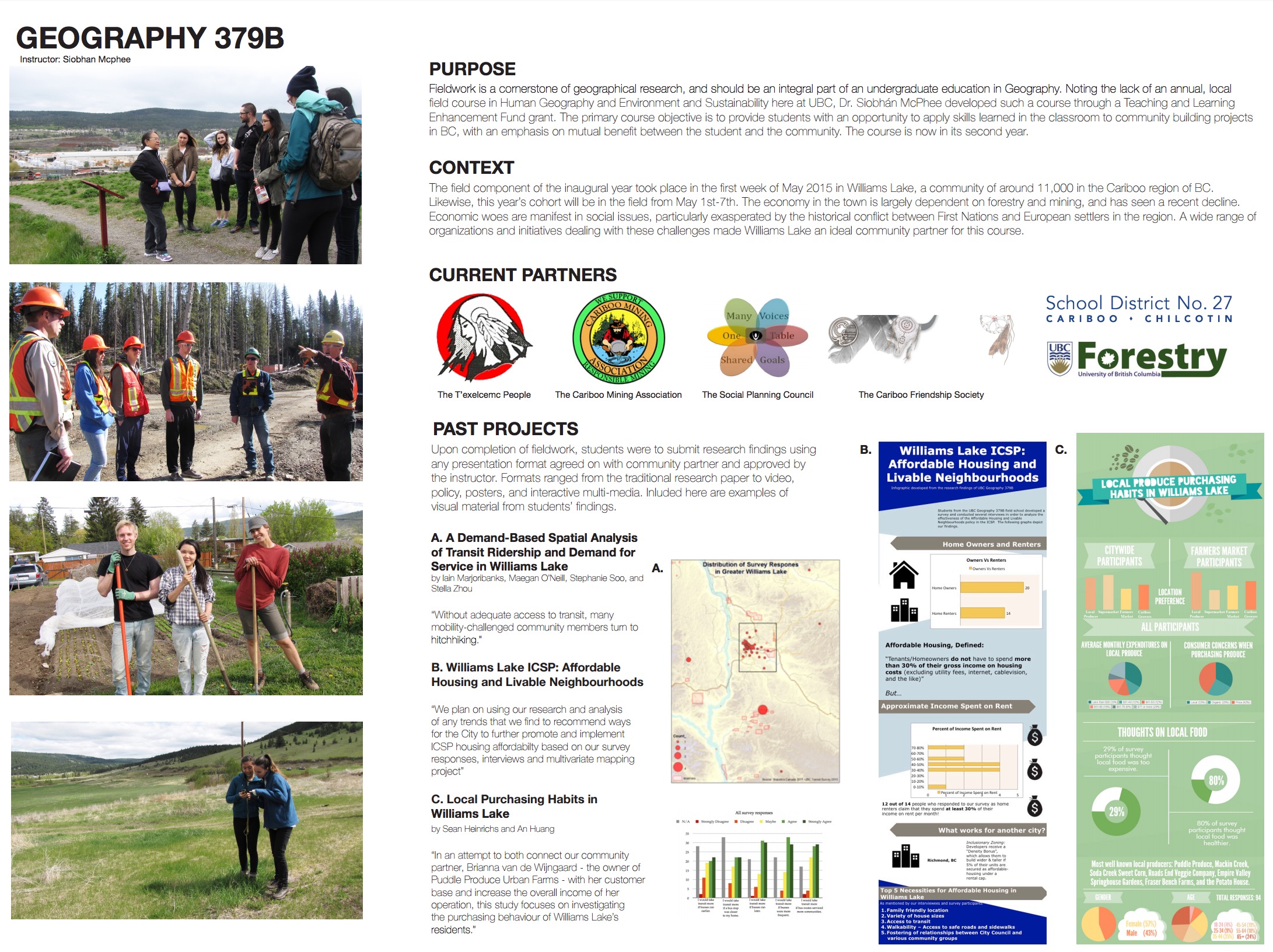 | 2016/2017 | Small TLEF | Siobhán Wittig McPhee | Year 3 | 4176 | 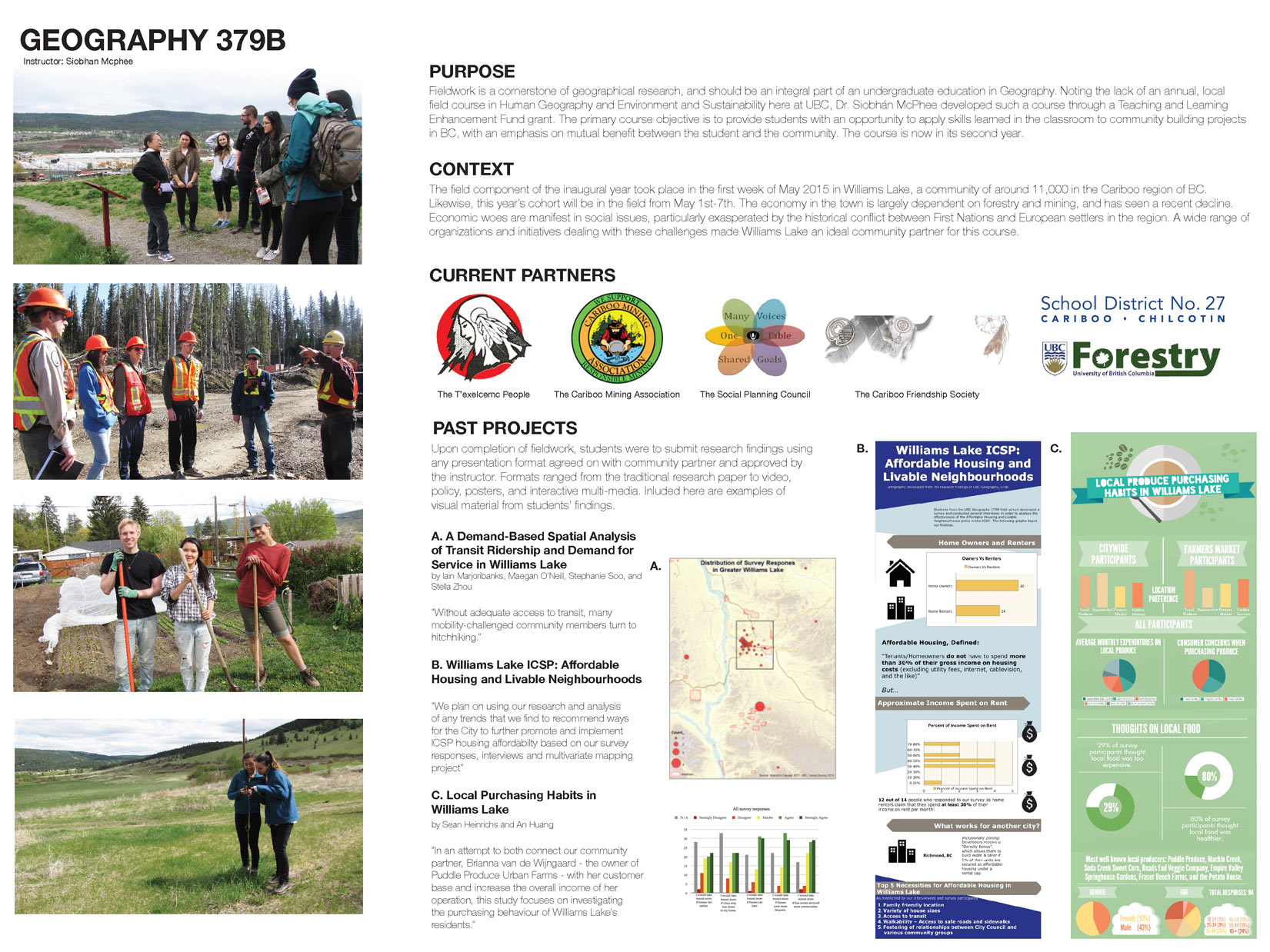 |
| 2014/2015 | Small TLEF | HsingChi von Bergmann | Dentistry | Enhancing Dental Student Learning Through an Interactive, Online, Competency-Based Progress Test System | Year 1 | 40200 | Completed | | | 2015/2016 | Small TLEF | HsingChi von Bergmann | Year 2 | 44032 | 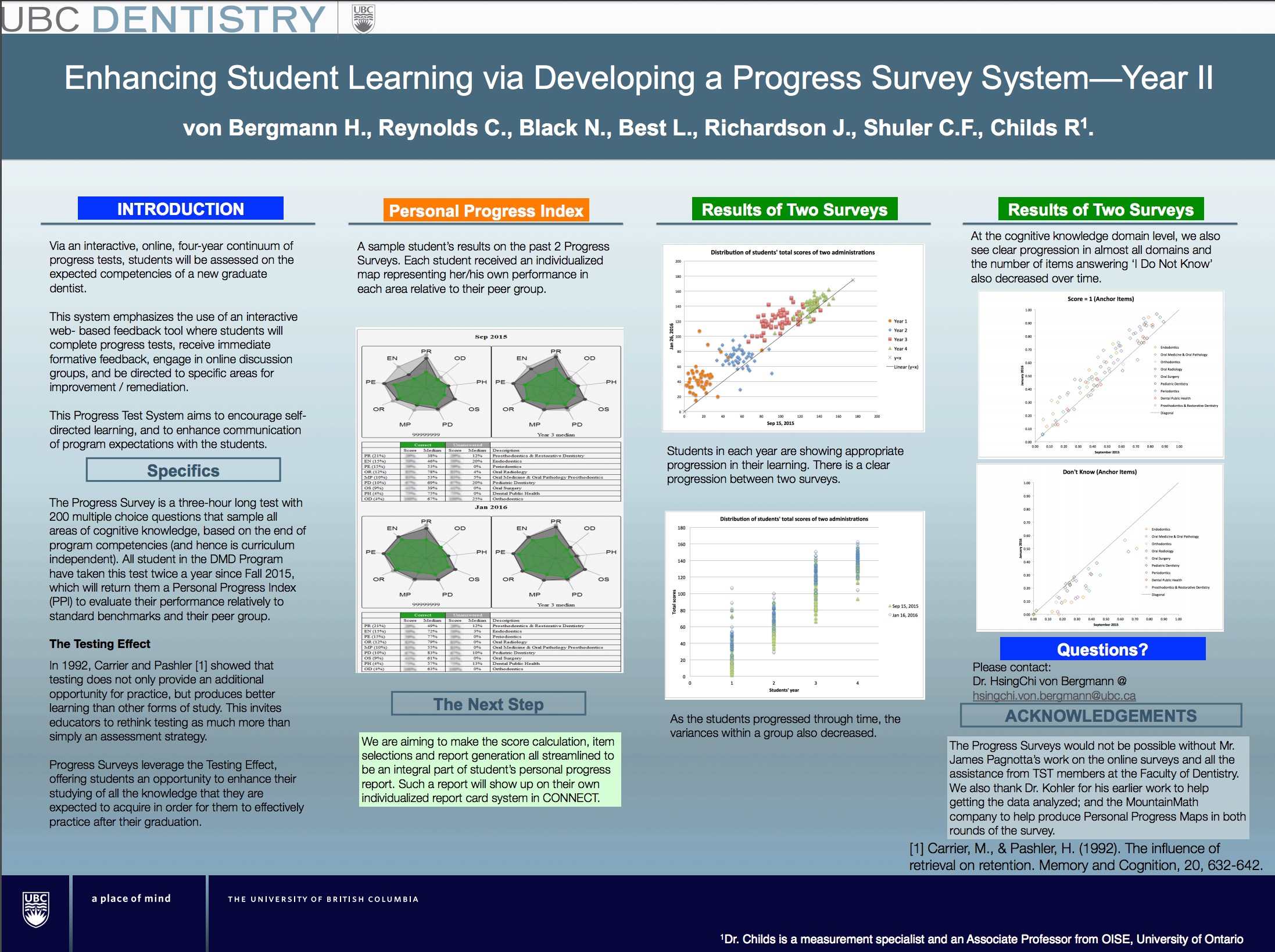 | 2016/2017 | Small TLEF | HsingChi von Bergmann | Year 3 | 43170 | 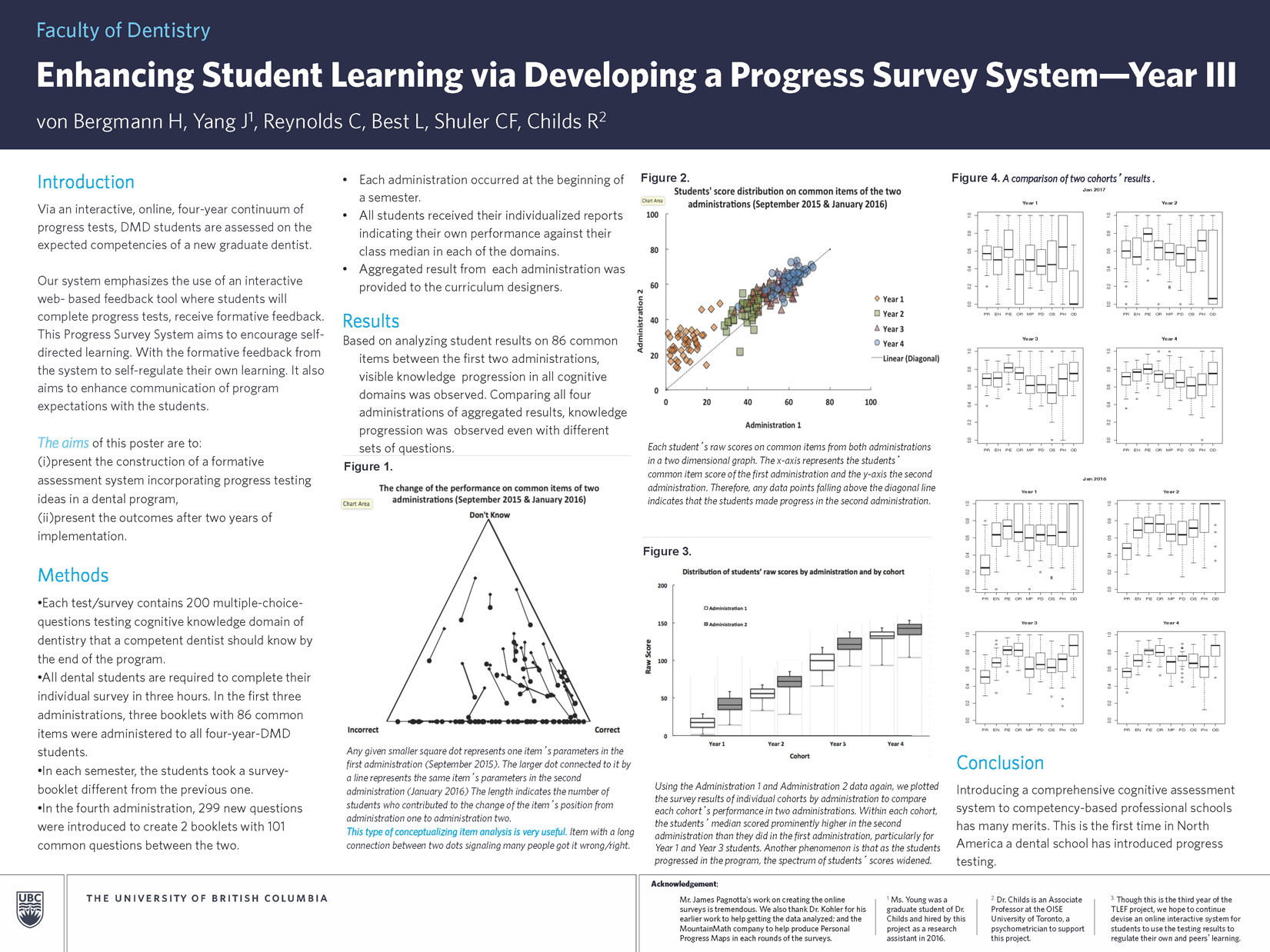 |